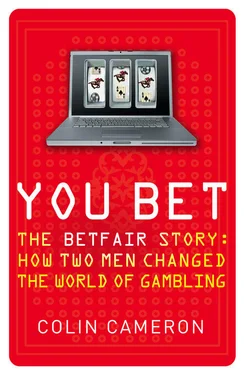The story of Betfair, of Black and Wray, is a story of our cyberspace age. Even after being wedded together for over ten years now, they remain a most unlikely pair. In the same way that the web can unite contrasting strangers many thousands of miles apart, their differences merge behind Betfair’s slick, uniform corporate image. The inviting open-plan offices at Hammersmith spread over two floors with riverside views for open-minded thoughts convey a sense of togetherness. Their respective strengths do come together in a way that means the whole greatly exceeds the sum of the parts.
Black is a warm, avuncular family man – four children and counting – albeit with an eccentric side that can leave someone meeting him for the first time feeling unexpectedly detached at any point in a conversation as his thought process departs on an unexpected tangent. As good a companion, especially against a backcloth of live sport, Wray is rather more direct. There is a greater urgency in him to reach the point of a conversation. He has just the two children but might leave them with his in-laws while he travels. (He did on a trip to South Africa in 2007 to attend a wedding and ended up, to his amusement, with Chris Bell, chief executive of Ladbrokes, for company, instead). There is little ceremony with Wray. When they met at that garden party in 1998 it was perhaps only the strength of Black’s idea that held them together for long enough that the pair agreed to talk again. Otherwise, there would be no partnership, no corporate identity. Black and Wray would have disappeared back into their own worlds, as if they had simply brushed shoulders amid the bustle of bookmakers on Britain’s racecourses, at the casino, or found themselves temporarily facing each other across a poker table. At bridge, with the money down, they might even have been rivals, which could have added an edge to Jeremy Wray’s annual summer party. Instead, today they remain a study of contrasts, individuals who still exist apart but bound together, Wray as Betfair’s chairman, Black as a board member, with a shared founder’s stake.
Of course, both Black and Wray are gamblers by nature. In general, Andrew Black wins. He only ends up in the red when he becomes bored or sentimental. When he loses interest or focus, he also loses his edge, and likewise, his money (which also, incidentally, is as likely to underwrite a horse’s supply of Polo Mints as burden the beast with expectations of a weighty bet). Now nearly a decade since he and Wray set out together in business, and although now not involved with day-to-day matters, he remains a totem to Betfair’s future. His association with the company – he is still on the board – is comfortably the longest one of his professional life.
Wray’s big gamble was to back Black in seeking to introduce technological innovation that brought stock market computer software systems to the worlds of betting on racing and sport, and, along with brilliant marketing, made the pair multimillionaires. Wray gambled with his own time and at a sizeable opportunity cost. He gave up lucrative returns in the City for a tiny office space in Wimbledon, without trappings of his former corporate world. There was no guarantee that he would make a living from his new berth, and if not, be accepted back into the financial comfort of the City. He literally bet on Black.
Black and Wray won handsomely. Those venture capitalists who passed on the chance to invest in Betfair stock have reason to rue their poor judgement in not bankrolling the pair. Thanks to friends and contacts who, along with some of the more enlightened City institutions – in all 170 shareholders – came up with the multimillion pound funding, in seven years Betfair grew from a company with about ten clients to one with a turnover of billions returning a profit of £27 million in the 2006 financial year. Their stakes increased in value over 130-fold. In March of the same year, the 23 per cent stake in Betfair bought by the Japanese Internet group, SoftBank, for £355 million valued the company, overall, at £1.54 billion. This netted Black and Wray, who sold 1 per cent of their stakes, an initial £15 million each, still leaving them with a shared 26 per cent of the business. Others took the opportunity to convert holdings into real money. This is not a story of paper millionaires. The 330- acre farm in Surrey that Black today calls home is proof of the true substance to Betfair’s success. In September 2008, customer number two million – a 59-year-old Swedish national, wanting to bet on John McCain in the US presidential race – signed up for Betfair, less than two years after the one million barrier was broken. Others like him generated revenues in the 2007 financial year of £181 million and profits of £19 million, up from £32 million and £7 million, respectively, in 2003.
Both Black and Wray have already registered significant profit from Betfair, namely when 23 per cent of the company was sold, yet still leaving them with the biggest stake. What’s more, this initial private sale may be also simply a prelude to a wholesale flotation in the future. Then their return from the company will be worth many times more than what they have already redeemed, to date.
Ultimately, few begrudge Black and Wray their spoils and whatever else they clear when the company does eventually go to market. In particular, few begrudge Black. In his case, money will never compensate him for the double tragedy of his life. Two decades ago, his brother, Kevin, died of a brain tumour. In 1984, Black, at least now blessed with a wonderfully extended family, had dropped out – or been kicked out, depending on whose version you accept – of university and spent the two years nursing his sibling. The decade that followed claimed Black’s father, to whom he was particularly close. He contracted MRSA after a routine operation. Black was devastated. He resorted to a life that was simply eating and sleeping. He retreated socially. He felt numb. He stayed indoors watching television, listening to the radio, reading. On reflection he might well have been depressed. At the very least, he went into traumatic shock. Then, he snapped out of his trance. At this stage in his life, Black had already hit on the idea of Betfair. He had been devastated by his brother’s death and was also hit hard by his father’s passing. In the case of his father, the sadness actually served to galvanise him. He kicked himself up the backside. His refreshed thinking became: if I do nothing Betfair will end up just another idea, and when my own time approaches, nagging away would be the thought that perhaps the greatest opportunity of my life passed me by. His brother and father would have expected more of him, he thought. Then he met Wray.
That so much has ultimately stemmed from the initial meeting between Black and Wray – to them and to the world in which they live – cannot be underestimated and is perhaps hard to comprehend. It may be easier to understand by considering that had Black and Wray not been behind Betfair they would have both been clients. Both fit a modern-day profile of a new type of gambler that is a growing constituency of well-informed, technologically proficient, affluent risk takers. Betting is as much an investment hobby as speculation to them. Most important for Black and Wray was that the timing proved to be perfect. Betfair both coincided with, and helped to create, an upheaval in betting, the way we bet and the way we see betting, the way government perceives betting, and how betting engages with world sport. This book will encourage you to consider how much of this was the serendipity, foresight, and planning of two free thinkers meeting at a garden party at the right time, with the world ripe for change and hungry for innovations, and how much was what everyone who gambles needs: luck.
Читать дальше











